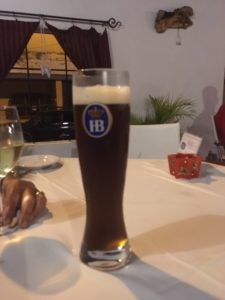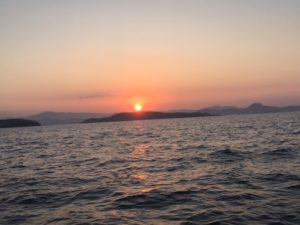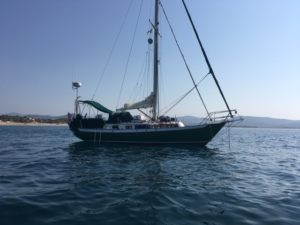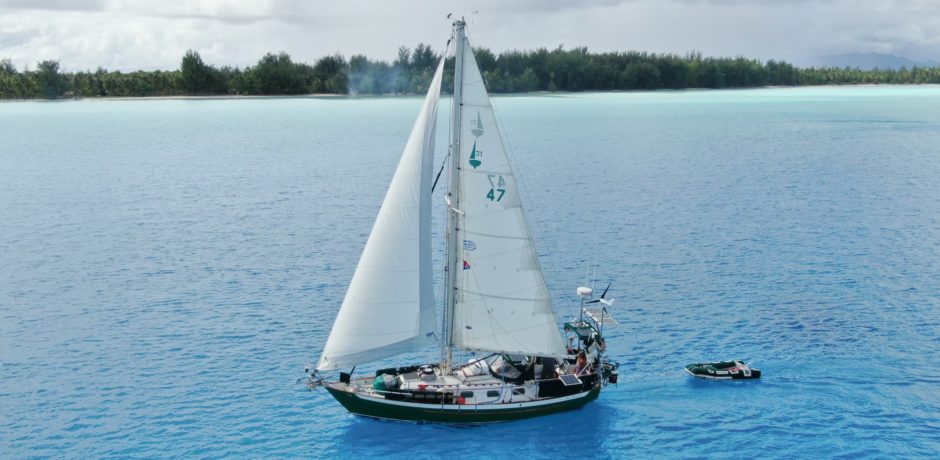After leaving Marina Vallarta on Monday January 2nd, we sailed the short distance over to the La Cruz anchorage for a few nights’ stay, followed by one night at the La Cruz Marina. It was nice to be at the Marina so we could enjoy an evening in town, where we got to see “Traveling Band,” a favorite musical duet husband/wife team that specializes in Fleetwood Mac, The Who, The Beetles and Creedence covers. They are hugely entertaining and very nice people. We saw them at Ballena Blanca, an open air bar just outside of the Marina entrance.
We also went to the German restaurant, Black Forest, which is very authentic, has great food and bottled German beer. There was only one other couple there the night we went so it was very quiet. The proprietor remembered us from last year and greeted us warmly.

Great German Beer at Black Forest
We had planned to go to a favorite restaurant, Roberto’s, high on a hill across the main highway with a beautiful view of the bay and the best mango margaritas we have had to date. Unfortunately, we found that Roberto’s had closed down, due apparently to an unreasonable increase in rent by the building’s owner. Apparently Roberto has another restaurant in Puerto Vallarta, but we have never been there. Also, sadly, the Red Gecko was shut down. They are in the heart of La Cruz and were a fun place with some good food and lots of live music. Not sure what the story was there. It was owned by a gringa and was a very popular spot. They would announce their daily specials and events on the morning cruiser net in La Cruz. Seeing this change and other recent life events in our families really made me think of how temporary and fragile everything is and how things can and do change in an instant. It reminds me how important it is to enjoy every day, each sunrise and sunset.

The restaurant that once was our favorite in La Cruz, Roberto’s, is no more
The water available for filling our tanks at the La Cruz Marina lived up to its reputation of being full of minerals. We use a two-stage filter on water we put in our tanks from marinas even though we do not use this water for drinking, just for dishes, showering and such. I wanted to give the boat a good wash down before we left, which I did, but of course it left water spots on everything and was not much better than the saltwater I was cleaning off!
Our plan was to spend a night in Punta de Mita before heading south past Cabo Corrientes and on to Chamela bay, a distance of 109 miles. We waited for the afternoon thermal to bring the wind before we left La Cruz for Punta de Mita. We only had about 10 miles to go to our destination. Leaving the Marina about 14:30, we tacked back and forth in the bay, slowly making our way to our destination for three hours but the wind was right on our nose. So even though we were moving pretty fast, we weren’t making much headway towards our destination. We enjoyed the sailing until it was an hour before sunset and we still found ourselves 4.5 nm away, so we started the engine and headed into the wind towards our destination.

The zig zag black track line shows we would have been sailing all night just to get a few miles more, due to the wind on our nose. You can see where we doused the sails, turned on the motor and headed straight for the anchorage
We arrived shortly after sunset, but it is a bay we know well and is easy to navigate so no worries. We settled in where we expected it would be very calm in about 14 feet of water and in the lee of the shore. We sat on the bow and watched all the lights on shore and heard some nice music playing from one of the beachfront palapa bars. We went to bed early to be ready for our overnight journey down the coast. No sooner had we settled in that the rolling started. It was one of the rolly-est nights on record and I doubt I got more than two hours sleep!
In the morning I made some strong coffee and we attempted to get ourselves and Cool Change ready for our departure. We had estimated this trip would be about 22 hours as it was 100 miles we would be traveling. Yes we are a slow boat! If we average 4.5 knots on a passage we are happy. But then you do not travel in a sailboat because you are in a hurry! We got underway at 11:00. The weather reports all showed very light north and westerly winds, and they were accurate. Punta de Mita is at the northernmost end of the bay, but the southernmost part, Cabo Corrientes, juts out many more miles into the Pacific. Because of this geography, we did not clear the bay and the point at Corrientes until around 3pm. While we were still in the bay, Cindy sighted a whale at a hundred yards off our starboard. I was able to catch sight of the fluke before he disappeared no doubt diving deep and long, as we did not see any more of him.
We had been motorsailing for several hours when the wind finally came up enough to shut down the engine and start to sail downwind, wing on wing using the whisker pole on the headsail. We were able to sail for the next 6 hours until the wind died off. It was another beautiful sunset and we toasted it with a shot of our favorite rum.

Another beautiful sunset
We were going to try a new watch schedule on this trip and see if it was any easier / more restful. Cindy went below before the first official watch and got a couple hours rest. Then, she took the watch from 21:30 until 02:00 when I would take over until the morning. The idea was that we would each only really have to wake from a sound sleep one time instead of twice, as we did under our previous plan of a three hour rotation. It seemed to work well as Cindy was wide awake during her watch and I was ready to go and rested when I got up to take over at 02:00. The moon was waxing and Cindy had the light of a half moon to keep her company on her watch. She told me she had lots of traffic on her watch. Commercial fishing boats from both directions and so close she had to narrow her radar guard zone to almost nothing to keep it from constantly alarming. At the same time she was dealing with a faint target shown on radar directly in her path but that she could not see visually. She needed to break to the right to avoid it while at the same time keeping enough distance from the trawler closing on starboard. This can all be a bit intimidating and you really need to keep your focus and make the right decisions. At this time we were only five miles off shore so not much room to maneuver towards land. Eventually, she saw the target that had been dead ahead and it appeared as a solid red light, not on a vessel but apparently some type of uncharted marker buoy five miles off shore.
When my watch began, the moon had set and it was an inky black night, so dark it was hard to see where the water and sky separated. The stars were brilliant above but did not help to light the way. I saw several meteorites flash across the sky and one that was particularly memorable as it appeared to drop straight down rather than shoot across, and it seemed to a move much slower than the normal meteor. Not long after my watch started, I picked up two targets on the radar that were directly behind us, about eight miles off. As I kept a watch on them, I could see that they were going to be overtaking us within a couple of hours. Soon I could see their bright working lights off in the distance. (International maritime laws give working fishing boats the right of way due to their lack of maneuverability when retrieving or deploying nets or long lines. We are expected to get out of their way and any collision would be looked upon as our fault. However, they rarely hold their course so knowing how to get out of their way is difficult, and without knowing if they are dragging nets, falling off behind them is dangerous too.) The approaching traffic got within three miles directly off of our stern, and then I noticed they were starting to move towards the shoreline and looked as if they would pass me within about a mile off our port side. By this time I was sailing again as some wind had come up and we were moving very slow, (3.8 knots) under the headsail with about nine knots of breeze. About the time the fishing boats were abeam of us, they both slowed down to a point that they remained off our beam and a bit over a mile off. I expect they were dealing with their nets, replacing or retrieving. We were coming up to the waypoint we had plotted where we would begin to head in towards shore to our destination. Very slowly I turned towards shore and let the trawlers move across our bow. They passed less than a mile from us and I watched as the safety margin slowly grew to about 3 miles. Then I was able to get back on course for the entrance of Chamela Bay.

Sunrise entering Chamela Bay
When we got there, it was almost 07:30 and just past daybreak. We had arrived a few hours earlier than we had expected. I waited till we were entering the bay to wake Cindy. She came on deck and took the helm while I prepared us to anchor. When we got into the actual anchorage, the water was perfectly calm with no breeze, which made it hard to tell where the boats already there had placed their anchors. If there was some current or breeze, the boats would be all pointed in the same general direction and likely at the end of their chains. After a couple of passes and failed attempts to set the hook in a place that felt good, we gave it up and went to the outside of the perimeter far away from any other boats and set the hook. We were so tired, we both just took a shower and went to bed where we slept till late in the afternoon. When we got up we realized we had not even turned off our navigation and steaming lights.

Cool Change at anchor in Chamela Bay
Cindy’s Reflections
Shifting to a four to five-hour watch schedule instead of our customary three-hour watch schedule gave me more time to reflect on the vastness of the ocean, and the hundreds of square miles of steep mountain wilderness on shore five miles away, interrupted only by some small coastal towns here and there where all the residents were strangers to me, and more importantly, I was a stranger to them. Even the boatmen on the commercial fishing vessels traveling in the same waters as I, have probably nothing more in common with me than our choice to be out on this ocean together. Rick and I were very much alone out there in that midnight voyage, and at the very moment I was pondering this reality, Rick was sleeping down below, so it was really just I alone experiencing this existential epiphany.
It was interesting to me that as I observed this condition of our utter vulnerability, alone at night floating in the vast ocean waters off a foreign country’s shore, with nothing more than a half-moon and some navigational instruments to find our way, I was at once free of any sense of fear or trepidation whatsoever, and at the same time, acutely aware of how intensely frightened any normal person in their right mind might be, faced with the same circumstances. It occurred to me why some people tell me they could “never in a million years” imagine themselves doing this.
It is as though I am under the spell of some benevolent god of the ocean or other, who has promised me that I should take for granted it will all be ok no matter what happens; that Rick and I can handle whatever emergency that comes along; that we have enough safety gear and redundant systems, and most importantly, enough training and experience, to weather any storm, literally and figuratively. Now I know that this isn’t entirely true; first of all, the best sailor is one who knows the sea still has lessons to teach them, and second, neither Cool Change nor Rick and I are infallible. Yes, we could die out here, but it doesn’t really feel to me a whole lot more likely that could happen than if we were to get run over by a truck crossing the street.
A big part of my growing confidence, I think, is indeed that we did have excellent training, and that we have been doing this for going on seven years now. And avoiding fishing boats off the coast of Mexico is nothing compared to steering through fog in a busy San Francisco Bay at night by radar alone. I would never have felt comfortable alone on deck steering at night while in my class trips, but now, single person watches are the norm. I welcome having obstacles in my path to keep me alert and give myself something to do instead of dozing off accidentally.
Nevertheless, I confess, as I realized during this overnight passage, all rationalizations aside, there is something inherently dangerous, a lust for the adrenalin rush of confronting the unknown, perhaps, that defines us as just slightly crazy for undertaking this adventure.
